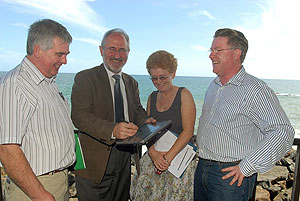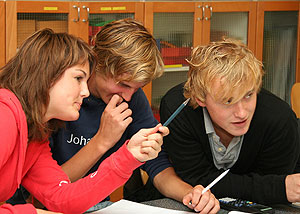REDMOND, Wash. — Jan. 15, 2010 — The motto at Viktor Rydberg School Foundation near Stockholm proclaims, “The Mind Wants to Have Fun,” and these days that seems to be quite true. Students and teachers at the foundation’s schools use laptop computers as well as Tablet PCs with interactive screens that everyone can access. Collaboration and creativity are at an all-time high.

Education Officer Seamus Ryan (second from left) demonstrates the use of a Tablet PC to his colleagues at County Meath VEC in Ireland.
“Students say they are having more fun at school because they can use IT in a creative fashion,” says Bo Kristofferson, principal headmaster. “When you have a desire to go to school, you also perform better.”
Viktor Rydberg is one of more than 40 educational institutions that make up the Microsoft Partners in Learning Innovative Schools Program. Established in 2007 as a pilot program, the initiative connects educators from around the world and enables them to share ideas and best practices. The goal is to create new learning models that inspire students to engage more deeply and direct their own education, as well as to prepare them for a rapidly changing, connected world.
Community support comes from Mentor Schools in the program, such as County Meath VEC, a district in Ireland that has transformed education from the standard lecture format to a more interactive, student-centered approach.
In 2007, Dunshaughlin Community College, part of Meath VEC, took part in the Innovative Schools pilot program, implementing technologies and new teaching methodologies that led to a revamp of the entire district.
“We wanted to further deepen the transformation process at Dunshaughlin and bring about district-wide change,” says Seamus Ryan, education officer for County Meath VEC. “Our entire district represents the Mentor School in the program because of the experience we’ve had bringing change across nine schools.”

Students at Viktor Rydberg School Foundation outside Stockholm collaborate in the classroom.
Adds Kati Tuurala, worldwide academic program manager for Microsoft Partners in Learning: “There is a lot of demand from around the world to focus on system-level changes, how entire schools can develop a culture of innovation. Microsoft has focused on supporting innovative teaching practices for some time, but we came to realize that it can sometimes be difficult if a single teacher is the only person within a school trying to implement change.”
How the Program Works
The Innovative Schools Program is made up of 12 Mentor Schools and 30 Pathfinder Schools, as well as third-party experts and government ministry representatives. Mentor Schools are those that have successfully transformed their approach to teaching and implemented technology into the learning environment. These schools share their expertise and offer support to the Pathfinder Schools as they move through similar processes in their own regions.
Pathfinder Schools demonstrate a strong vision for how they would like to transform their learning environment and are enthusiastic about collaborating with other educators from around the world. These schools have community and professional support for the change process and strong school-level leadership.
“The Innovative Schools Program offers an exchange of experience,” Ryan says. “I would like to see relationships develop between members of my staff and people from each of the Pathfinder Schools we are working with — perhaps even joint projects between students in the various schools around the globe.”
Any school worldwide can apply to become a Pathfinder School. The application process includes written and video documentation, interviews with school leadership, and on-site assessment.
Pathfinder School: Viktor Rydberg School Foundation
Viktor Rydberg School Foundation had already integrated Microsoft products into its IT infrastructure when the leadership team found out about the call for applicants from the Innovative Schools Program in spring 2009.
“I was impressed with the Innovative Schools Program because it’s geared toward helping with implementation and leadership in the innovative process,” Kristofferson says. “Support focuses not only on technology and equipment but also on the aspects of getting it neatly and nicely woven into the scheme of things at your school.”
Educators at Viktor Rydberg have implemented changes in their education system around four key pillars: mobility, accessibility, visibility and collaboration.
There are no stationary computers at Viktor Rydberg, and the school offers wireless Internet access from anywhere on campus. All learning environments feature computer projectors so that everyone can easily see what is being taught. The Viktor Rydberg school portal uses Microsoft Office SharePoint Server for collaboration and information sharing. Teachers can post student test results, course details and topical information. Students can get assignments and easily share finished projects with other students.
Kristofferson hopes that through the use of technology and a more innovative learning environment students will become more self-sufficient learners, taking the initiative to teach themselves.
“I feel very inspired by this program,” Kristofferson says. “I’m thankful that the program has matched us with schools in a similar process that we are in. Our primary goal is to teach our students to use technology for the purpose of learning — that will benefit them well into the future.”
Mentor School: County Meath VEC
This year County Meath VEC will provide mentorship to five Pathfinder Schools in the Innovative Schools Program. The district has focused on making changes to the way teachers do things from a logistical standpoint as well as making systemic changes that transform the way students are involved with learning.
Ryan attributes Meath VEC’s success to the Innovative Schools 6i Process, which provides a framework for decision-making that can be applied to educational communities everywhere. This framework includes:
-
Introspection. The leadership team undertakes a rigorous self-evaluation, looking at how it is currently approaching all aspects of education.
-
Investigation. The team collects hard data about how the school operates and what is needed for transformation. Team leaders review best practices and innovations from Model Schools, and make contact with advisors.
-
Inclusion. Relationships and feedback mechanisms are established within the community, and the school draws from community expertise and resources.
-
Innovation. The team develops a road map for transforming learning in all areas, including curriculum, pedagogy, leadership, technology and learning-space design.
-
Implementation. Ideas and planning are put into practice. Changes might include new learning-space construction, professional development, creation of the technology infrastructure, or piloting of new teaching practices.
-
Insights. By capturing what is learned along the way, schools can develop processes for ongoing improvements and find ways to share successes with other schools.
A Meeting of Like Minds
To kick off the yearlong collaboration, leaders from all 42 Pathfinder Schools and Mentor Schools attended a workshop in Salvador, Brazil, at Microsoft’s Innovative Education Forum, Nov. 4–6. Participants came together to share ideas and begin the process of rethinking all aspects of school life, from the structure of the day to the use of technology in curriculum and how teachers can bring innovative practices into the classroom.
“Many school leaders thought the workshop experience was mind-boggling,” Microsoft’s Tuurala says. “Many had never met with educators who are thinking like they are thinking. They met with schools from all over the world that are going through the same experiences. It was powerful for them to realize they are not alone.”
Throughout the year, participants attend Virtual University sessions via Microsoft Office Live Meeting on topics of interest every two to three weeks. They also will be a part of the Partners in Learning Network, an online community that offers a less formal way for educators to interact.
Ultimately, the goal is to support the Pathfinder Schools as they set a benchmark in their regions and then reach out to other schools to foster educational innovation.
“If we can help these professionals really believe in their ability to deliver transformation — not only in their own schools but in the communities around them — these educators will build the future,” Tuurala says.




